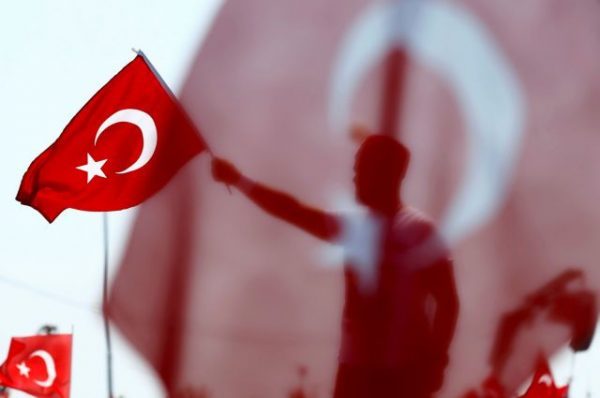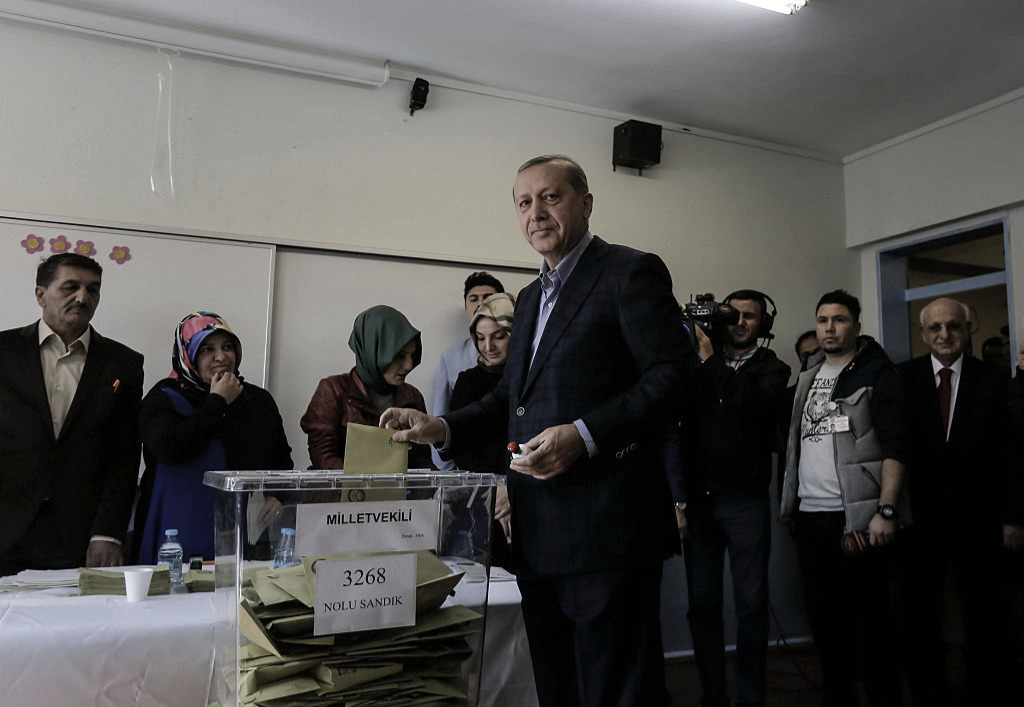
Τι θα συμβεί αν ο Ερντογάν χάσει οριακά τις προεδρικές εκλογές και το κυβερνών ΑΚΡ με το συγκυβερνών ΜΗΡ χάσουν την κοινοβουλευτική πλειοψηφία;
Τo Gatestone Institute δημοσιεύει άρθρο του Burak Bekdil για την πολιτική κατάσταση στην Τουρκία και για αποτελέσματα δημοσκοπήσεων, με εκτιμήσεις εκλογικής δύναμης των κομμάτων, σε μια περίοδο που ο Ρετζέπ Ταγίπ Ερντογάν φαίνεται να χάνει έδαφος καταγράφοντας απογοητευτικά για τον ίδιο αποτελέσματα.
Τίτλος του άρθρου για τον πρόεδρο της Τουρκίας είναι « Οι 243 νύχτες αϋπνίας τον Ταγίπ Ερντογάν».
Σύμφωνα με δημοσκόπηση της εταιρείας Yöneylem, το 63% των ερωτηθέντων δηλώνει ότι η Τουρκία έχει «κακή διακυβέρνηση» και το 58,7% λέει ότι «δεν θα ψήφιζε ποτέ τον Ερντογάν».
Μόνο το 33,3% των ερωτηθέντων δήλωσε ότι θα ψήφιζε τον Ερντογάν, ενώ το 55,6% δήλωσε ότι θα ψήφιζε τον υποψήφιο της αντιπολίτευσης.
Τα αποτελέσματα της δημοσκόπησης προοιωνίζουν μια εύκολη επικράτηση της αντιπολίτευσης και μια ιστορική ήττα για τον τούρκο πρόεδρο. Είναι ξεκάθαρο ότι το 2023, για πρώτη φορά έπειτα από την πρώτη του εκλογή το 2002, ο Ερντογάν δεν θα είναι ο επικρατέστερος υποψήφιος.
Ωστόσο δεν θεωρείται πιθανή μια ομαλή δημοκρατική μεταβίβαση εξουσίας, καθώς τα έξι κόμματα της αντιπολίτευσης (CHP, IYI και άλλα τέσσερα μικρότερα) έχουν διαφορετικές ιδεολογίες και ενώθηκαν για να κατεβάσουν κοινό υποψήφιο απέναντι στον Erdogan. Πιθανότερος υποψήφιος είναι ο ηγέτης του CHP, σοσιαλδημοκράτης Κεμάλ Κιλιτσντάρογλου.
Ο ρυθμιστής
Σε αυτή την περίπλοκη εικόνα, η κουρδική μειονότητα της Τουρκίας που αντιστοιχεί στο 11-13% του πληθυσμού της θα είναι ο ρυθμιστής, καθώς οι ακραία εθνικιστικές και αντικουρδικές πολιτικές του Ερντογάν τούς έχουν απομακρύνει από το κυβερνών κόμμα ΑΚΡ.
Επίσης, ένα νέο σπιράλ τρομοκρατικών επιθέσεων ίσως συσπειρώσουν τους Τούρκους γύρω από τον πρόεδρό τους, ενώ ένας πακτωλός χρημάτων από φιλικές της Τουρκίας χώρες, όπως το Κατάρ και η Ρωσία, μπορεί να κάνουν τους πεινασμένους Τούρκους να νιώσουν ότι σύντομα τα πράγματα θα γίνουν καλύτερα.
Εναλλακτικά, ο Ερντογάν θα μπορούσε να μπει στον πειρασμό να χειραγωγήσει το εκλογικό αποτέλεσμα.
Εμφύλιος;
Τι θα συμβεί αν ο Ερντογάν χάσει οριακά τις προεδρικές εκλογές και το κυβερνών ΑΚΡ με το συγκυβερνών ΜΗΡ χάσουν την κοινοβουλευτική πλειοψηφία;
Σχεδόν εμφύλιος, αναφέρει χαρακτηριστικά ο αρθρογράφος, προσθέτοντας ότι οι βίαιοι υποστηρικτές του τούρκου προέδρου θα αποδώσουν την ήττα του σε ξένο ‘παράγοντα’ και θα κατηγορήσουν την CIA και την Mossad.
Σε κάθε σενάριο, μετά τον Ιούνιο 2023, η Τουρκία φαντάζει σαν ένα πλοίο που βυθίζεται αργά, αναφέρει ο αρθρογράφος, προσθέτοντας ότι σύμφωνα με δημοσκόπηση της εταιρείας Optimar, το 76,6% των Τούρκων θεωρούν σημαντικότατα τα προβλήματα της ανεργίας και του πληθωρισμού.
Αναφέρεται, μεταξύ άλλων, ότι το διάστημα 2013-2021, το μέσο κατά κεφαλήν ετήσιο εισόδημα στην Τουρκία έπεσε από τα 12.615 δολάρια στα 9.587 δολάρια, ενώ ο επίσημος ετήσιος πληθωρισμός της Τουρκίας έφθασε τον Αύγουστο στο 80%. Σύμφωνα με τον ανεξάρτητο Οργανισμό ερευνών ENAG, ο πραγματικός ετήσιος πληθωρισμός στην Τουρκία ανέρχεται στο 181%.
Άλλη δημοσκόπηση ανεξάρτητου φορέα (Yöneylem Sosyal Araştırmalar Merkezi) δείχνει ότι αν διεξάγοντο αύριο εκλογές στην Τουρκία, το κυβερνών κόμμα ΑΚΡ θα έπαιρνε το 29,5% των ψήφων, το αντιπολιτευόμενο CHP το 29,7% και το συγκυβερνών με το ΑΚΡ εθνικιστικό ΜΗΡ μόνο το 6,4%.
Επίσης το κόμμα IYI θα έπαιρνε το 13,5%, ανεβάζοντας έτσι την συνολική δύναμη της ενωμένης αντιπολίτευσης στο 43,2%.
Πηγή: in.gr

Turkey: 243 Sleepless Nights for Erdoğan
by Burak Bekdil
-Yöneylem's poll also found that 63% of respondents say Turkey is being "badly governed," and 58.7% say that they "would never vote for Erdoğan." Only 33.3% of the respondents said they would vote for Erdoğan while 55.6% said they would vote for the opposition candidate.
-The numbers predict an easy win for the opposition and a historical defeat for Erdoğan. Clearly, 2023 will be the first election since 2022 in which Erdoğan is not the clear favorite. But a smooth, democratic transfer of power is unlikely.
-Six opposition parties, CHP, IYI and four small groupings with different ideologies, have come together to pick a joint presidential candidate against Erdoğan. The most likely candidate will be CHP leader Kemal Kılıçdaroğlu, a social democrat...
-In this complex picture, Turkey's Kurdish minority, representing 11%-13% of the national electorate, will probably be the kingmaker. Erdoğan's ultra-nationalist (and anti-Kurdish) policies have distanced Kurdish voters from his AKP, although Islamist Kurds still have a tendency to vote for him.
-A new spiral of terror attacks may make Turks feel they must unite behind their president. Billions of dollars flowing unofficially into the Turkish economy, from friendly countries like Qatar and Russia, may make starving Turks feel like they will soon be better off.
-Alternatively, Erdoğan could be tempted to manipulate the election result.
-What happens if Erdoğan loses the presidential election by a narrow margin, and the AKP and MHP lose their parliamentary majority -- a total end of the Erdoğan era, in other words? A near civil war.
-Erdoğan's violent loyalists will blame the defeat on a foreign plot, accusing the CIA, the Mossad, you name it.
-In every post-June 2023 scenario, Turkey just looks like a slow-sinking ship.
Since 2002, Turkish President Recep Tayyip Erdoğan has not lost a single parliamentary, municipal or presidential election. The dream story, however, may be over in June 2023 when Turks will vote in twin presidential and parliamentary elections. Pictured: Erdoğan casts his ballot at a polling station on November 1, 2015, in Istanbul. (Photo by Gokhan Tan/Getty Images)
Recep Tayyip Erdoğan, Turkey's Islamist president, has been invincible since he burst on the political scene three decades ago. In 1994, he was elected mayor of Istanbul, Turkey's biggest city. In 2002, he was elected prime minister and, in 2014, president of Turkey. Since 2002, he has not lost a single parliamentary, municipal or presidential election. The dream story, however, may be over in June 2023 when Turks will vote in twin presidential and parliamentary elections.
Turks are suffering. According to the findings of the pollster Optimar, 76.6% of Turks think their top problems are inflation and unemployment.
The country's nominal gross domestic product (GDP) fell from its peak in 2013 of $958 billion, to $815 billion in 2021, bringing down per capita GDP from $12,615 to $9,587.
Turkey's official annual inflation climbed to a fresh 24-year high of 80% in August – though ENAG, an independent research organization, estimates the true annual inflation rate at 181% for the same period.
Recent research by an independent pollster, Yöneylem Sosyal Araştırmalar Merkezi, revealed that the sharp economic downturn, a direct result of Erdoğan's mismanagement and foreign policy mistakes that have isolated Turkey, may do what his political opponents have failed to do until now.
The poll found that Erdoğan's Justice and Development Party (AKP) would win 29.5% of the national vote if there were elections tomorrow, behind, for the first time, the main opposition Republican People's Party (CHP), which would win 29.7%. Erdoğan's political ally, the far-right Nationalist Movement Party (MHP) would win a mere 6.4% of the vote, bringing the support for the ruling alliance up to 35.9%. CHP's main ally, The Good Party (IYI) would win 13.5%, lifting the opposition bloc to 43.2%.
Yöneylem's poll also found that 63% of respondents say Turkey is being "badly governed," and 58.7% say that they "would never vote for Erdoğan." Only 33.3% of the respondents said they would vote for Erdoğan while 55.6% said they would vote for the opposition candidate.
The numbers predict an easy win for the opposition and a historical defeat for Erdoğan. Clearly, 2023 will be the first election since 2022 in which Erdoğan is not the clear favorite. But a smooth, democratic transfer of power is unlikely.
Six opposition parties, CHP, IYI and four small groupings with different ideologies, have come together to pick a joint presidential candidate against Erdoğan. The most likely candidate will be CHP leader Kemal Kılıçdaroğlu, a social democrat, although the opposition bloc has not yet announced a candidate. Various opinion polls put Kılıçdaroğlu's approval rating far below Erdoğan's. Although the opposition bloc seems to be more united than at any time under Erdoğan's rule, the alliance also shows signs of fragility. Two parties in the opposition are former close allies of Erdoğan, a former prime minister and deputy prime minister. One ally is ideologically Islamist.
In this complex picture, Turkey's Kurdish minority, representing 11%-13% of the national electorate, will probably be the kingmaker. Erdoğan's ultra-nationalist (and anti-Kurdish) policies have distanced Kurdish voters from his AKP, although Islamist Kurds still have a tendency to vote for him.
Erdoğan will not go down without a fight. And that "fight" may mean many unpleasant scenarios. Some small-scale hit-and-run operations against Kurdish targets in northern Syria can be portrayed by the Erdoğan-controlled media (90% of all) as heroic military stories. A lot of barking (but no real biting) over the Aegean Sea may hit Turkish headlines, making nationalistic Turks feel proud of their president. A new spiral of terror attacks may make Turks feel they must unite behind their president. Billions of dollars flowing unofficially into the Turkish economy, from friendly countries like Qatar and Russia, may make starving Turks feel like they will soon be better off.
Alternatively, Erdoğan could be tempted to manipulate the election results. He did so in critical local elections in 2019, when an opposition candidate won the Istanbul mayoral race by a margin of 13,000 votes. Erdoğan annulled the election results and ordered a rerun. In the renewed election, the opposition candidate, Ekrem Imamoğlu, won by a margin of 800,000 votes.
What will happen in post-June 2023 Turkey? Too early to say. But a few safe, innocent assumptions will not do any harm.
Erdoğan, as a political brand, is much stronger than his party, the AKP. If there were elections tomorrow, the AKP and MHP would most probably lose their parliamentary majority to opposition parties. The critical question is: What happens if Erdoğan wins the presidential election but the AKP and its allies lose their majority in parliament? The answer is chaos. Erdoğan won't be able to pass laws in parliament. He can try to rule by issuing decrees. But that will not be sustainable. He would be forced into new elections.
A more critical question: What happens if Erdoğan loses the presidential election by a narrow margin, and the AKP and MHP lose their parliamentary majority -- a total end of the Erdoğan era, in other words? A near civil war.
Erdoğan's violent loyalists will blame the defeat on a foreign plot, accusing the CIA, the Mossad, you name it. They will take to the streets to attack the enemy: secular, anti-Erdoğan Turks. The AKP has millions of militant party members across the country, organized under institutional names like the Ottoman Hearths. It also has a strong bond with the military contractor company SADAT, established by retired Islamist officers. SADAT is often accused of training paramilitary groups in Syria and Libya.
Erdoğan has long been preparing for the doomsday scenario. In October 2016, Turkey's Directorate of Religious Affairs (Diyanet) issued a circular for the formation of "youth branches" to be associated with the country's tens of thousands of mosques. Initially, the youth branches would be formed in 1,500 mosques. Under the plan, by 2021, 20,000 mosques would have youth branches and finally 45,000 mosques would have them. Secular Turks feared the youth branches might turn into Erdoğan's "mosque militia," like the Hitler Youth in Nazi Germany.
In every post-June 2023 scenario, Turkey just looks like a slow-sinking ship.
Source: https://www.gatestoneinstitute.org/19026/erdogan-sleepless-nights

